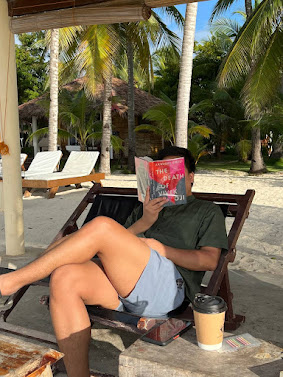“I’m not telling you a story, so much as a shipwreck一the pieces floating, finally legible,” said protagonist Little Dog. And this couldn’t have been more true to describe Ocean Vuong’s first novel. Writing in such sublime, elegant prose, Vuong told the stories of three generations of Vietnamese immigrants and the wars they encountered in their lifetimes, both tangible and not. On Earth We’re Briefly Gorgeous is an unforgettable feat for the acclaimed poet.
Before anything else, to say this book is a novel is more of a technicality that is related to its length (as I realize, is always the case with other novels), but I mention this because On Earth We’re Briefly Gorgeous could easily be regarded as a book of poetry. On each page, Vuong wrote lyrical vignettes narrated by his protagonist, Little Dog. But also, right off the bat, he said that this was a letter for his mother who barely understand the secondhand language of English, much less read a letter written in it. With that in mind, Little Dog expressed everything and didn’t leave any secret and any detail untold. Vuong even used the second perspective to really resemble that of a letter, but he broke this rule in some occasions, especially when retelling Grandma Lan’s tales. Vuong’s refusal to tell Little Dog’s life in a strict form and/or manner of writing一and paired with his wonderful mastery of words一was the factor that further evoked the dream-like quality of his storytelling.
Divided in three parts, Vuong told Little Dog’s, his mother, Rose/Hong’s, and his grandmother, Lan’s stories that began in the war. Although they did escape the physical factor of the warfare, it didn’t leave them unscathed. Part I was primarily about Little Dog’s childhood. How it was founded on violence, same as his mother and grandmother before him. In each vignette, Vuong went back and forth through different times and places to tell this family’s first years in USA, and also Rose’s and Lan’s lives in war-stricken Vietnam. The experience was kaleidoscopic, as the stories merged into one huge flutter of colors and events, like the flapping of the Monarch butterflies’ wings一a creature extensively used as a metaphor by Vuong. At some point, one could argue that Part I was fragmented in storytelling, but this is only because the author wrote in the semblance of that with schizophrenia. Little Dog’s retelling mostly came from tales told by his grandmother, whom he described as having a mental disorder since the war.
Part II was the most straightforward out of the three. This time, Little Dog celebrated the beginning of his puberty by working on a tobacco farm. There, he met Trevor who, Little Dog said in retrospect, would teach him how to want and desire. Lan and Rose’s stories were dropped in the background as the two boys were put front and center in this second segment. In the Acknowledgment page, Vuong mentioned artists and musicians whom he relied on during the process of writing this book. While I was not familiar with every name listed, I did notice that Richard Siken was included. And I thought that made total sense, because Part II reminded me so much of Siken’s book of poetry “Crush”. Both Vuong and Siken were great in caliber, but one couldn’t really shake off the influence of that devastating book of poems in here. In Part II, Vuong wrote about Little Dog and Trevor’s meeting and their unspoken, taboo love for each other. At the beginning of Part III, Trevor asked whether Little Dog decided to be really gay forever, to which the latter answered yes. Trevor replied that he would not be the same, that he would only be good for a few years. But across the second part, he expressed deep tenderness towards Little Dog that he, at times, failed to appreciate. Vuong closed this segment with a poem both about and for Trevor.
Part III was the most fractured among the three. It began with a death Little Dog couldn’t properly grieve. It continued with another death, but this time, he had mourned. And across the whole segment, Little Dog retold a handful of events in quick intervals, making reading it quite dizzying. Most of the vignettes on this part was written in a daze, under the influence of grief, regression and holding on to the past, and, by extent, the discovery of a mental disorder Little Dog has. Despite this, Vuong’s beautiful prose was intact, so at least, one could still hold on to this while trying to understand the chaotic storytelling of a much older Little Dog.
I began the book thinking that it would simply be about a multigenerational family’s story after the war, but it was more complex than that. In barely 300 pages, Vuong wrote about the war and its long-lasting, unshakable effects on the people involved, identity and feelings of misplacement in one’s own country, in a different country, in one’s own skin, sexuality, dominance, and submission and its power, violence in all its forms, drug addiction, and death. But all these factors can be found under the umbrella of one word and ultimately, that’s what Vuong wrote about: humanity. “All this time I told myself we were born from war一,” Vuong wrote. “But I was wrong, Ma. We were born from beauty. Let no one mistake us for the fruit of violence一but that violence, having passed through the fruit, failed to spoil it.” Similarly, this book was born from beauty.










0 Comments